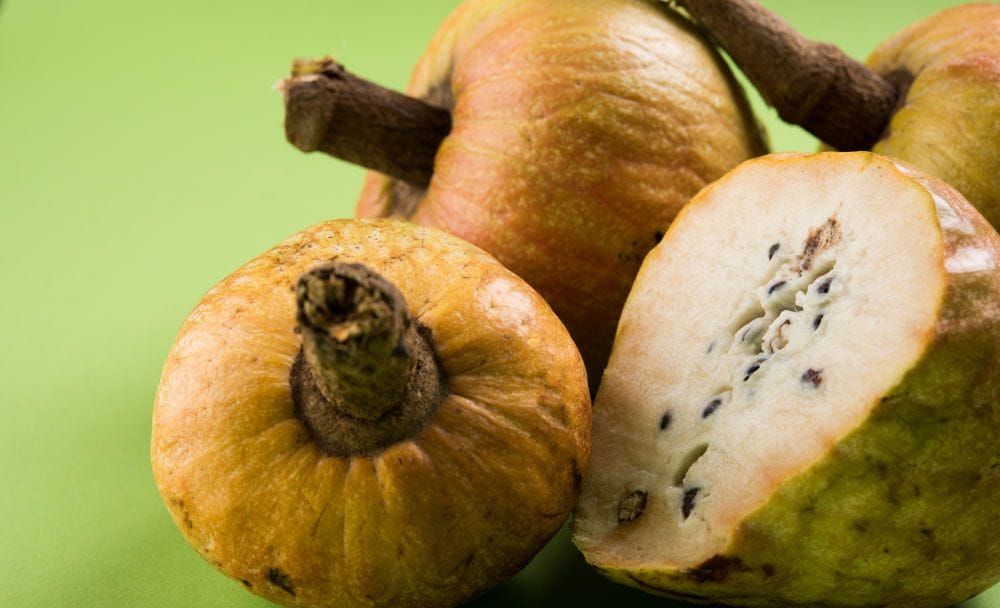Ram Phal, also known as bullock’s heart, is a tropical fruit that is native to Central and South America. It is rich in nutrients and has numerous health benefits. Ram Phal has a sweet and creamy flavor, making it a popular fruit in tropical regions.
In this blog, we will discuss the 15 benefits of Ram Phal.
Phytoconstituents of Ram Phal
Ram Phal has the presence of several phytoconstituents.
Stem bark: The stem bark contains tannins, alkaloids, and phenolic compounds.
Leaves: The leaves of Ram Phal plant contain a wide range of chemicals like alkaloids, amino acids, carbohydrates, steroids, flavonoids, proteins, tannins, glycosides, and phenolics.
Roots: The roots of Ram Phal plant contain constituents such as acetogenin, alkaloids, carbohydrates, proteins, flavonoids, and tannins.
The plant is also known to be enriched with minerals such as calcium, phosphorous, potassium, Magnesium, Sodium, Manganese, Zinc, Iron, etc.
Traditional Uses of Ram Phal
Ram Phal is known by various names across all geographies. It is distributed in various regions like Bengal, Burma, and Southern regions of India. Although, it is native to tropical regions of America, particularly in West Indies and South America. It is known as the bullock’s heart, custard apple, or Ram Phal.
The plant of Ram Phal has been traditionally used in various medicinal systems. It has been used for the treatment of epilepsy, dysentery, cardiac problems, parasite and worm infestations, constipation, hemorrhage, bacterial infection, dysuria, fever, and ulcers, and as an insecticide. The bark is a powerful astringent and is used as a tonic whereas leaves are used for helminthiasis treatment.
Benefits of Ram Phal
1. Antipyretic activity
In a study involving a comparative study between the antipyretic effects of Ram Phal and paracetamol, a crude aqueous extract of leaves of Ram Phal was used. The results showed that the extract of Ram Phal leaves has significant antipyretic activity.
2. Anti-inflammatory activity
Traditionally, the plant has been used as an anti-inflammatory agent in wound healing, anti-anxiety, anti-stress, anti-mutagenic, and spasmolytic agents.
A study depicted that the use of Ram Phal leaves as an herbal medicine in the treatment of inflammatory diseases shows positive results. They may be potentially useful in developing new anti-inflammatory agents.
3. Antiulcer activity
Crushed leaves or paste prepared from the flesh of Ramphal fruit is used as a poultice for abscesses and is also used for ulcers.
4. Gastrointestinal benefits
Decoction of the bark or dried or pulverized unripe fruit is used in the treatment of dysentery and diarrhea.
Leaves of Ram Phal are used to prepare tea for relieving colic. Warmed leaves are used for application over the abdomen to get relief from indigestion in babies and children.
5. Analgesic and CNS depressant benefits
Petroleum ether, ethyl acetate, and methanol extracts of Ram Phal show significant analgesic activity.
All the extracts also showed statistically significant mild to moderate central nervous system depressant activity.
Other Uses of Ram Phal
Ram Phal benefits range from using its decoction for alleviating fever or using other parts of the plant to treat malaria, and epilepsy, relieve toothache, and more.
The leaf and stem extracts of Ram Phal show inotropic, positive chronotropic and spasmolytic activities.
FAQs
1. What is Ram Phal?
Ram Phal, also known as bullock’s heart, is a tropical fruit that is native to Central and South America. It is rich in nutrients and has numerous health benefits. Ram Phal has a sweet and creamy flavor, making it a popular fruit in tropical regions.
2. How can Ram Phal be consumed?
The fruit can be consumed as is due to its sweet, creamy texture. Many people now use Ram Phal in milkshakes or utilise the pulp in smoothies, or eat it with the garnish of certain dry fruits.
3. What are the traditional uses of Ram Phal?
The plant of Ram Phal has been traditionally used for the treatment of epilepsy, dysentery, cardiac problem, parasite and worm infestations, constipation, hemorrhage, bacterial infection, dysuria, fever, and ulcers, and as an insecticide.
Conclusion
Ram Phal is a tropical fruit that is rich in nutrients and has numerous health benefits. It can help to improve digestion, immune system, heart health, weight loss, energy levels, bone health, inflammation, vision, brain function, anemia, blood sugar, skin health, liver health, stress, and hair health. The plant is anti-anxiety, anti-stress, and anti-mutagenic by nature. By incorporating Ram Phal into your diet, you can support overall health and wellness naturally.
Disclaimer: The information mentioned here is for educational purposes only and is not intended to be an alternative to medical treatment by a medical practitioner. Please consult a professional medical practitioner before any dietary modifications.
References:
- Annona reticulata Linn. (Bullock’s heart): Plant profile, phytochemistry and pharmacological properties
- A COMPREHENSIVE REVIEW ON ANNONA RETICULATA




















